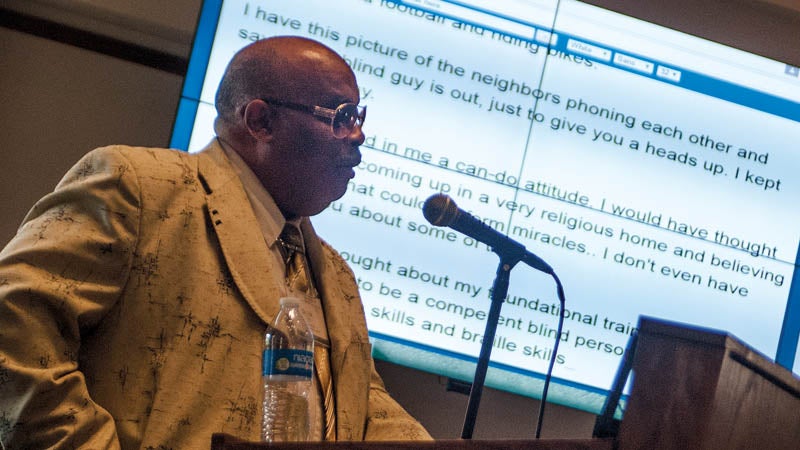OUS hosts first Envision Access Conference
Published 11:42 am Monday, March 27, 2017

- Keynote speaker Dr. J.W. Smith speaks to eventgoers at Ohio University Southern at the Envision Access Conference Friday afternoon.
Focuses on students with disabilities
The Ohio University Southern Council of Diversity and Inclusion hosted its first annual Envision Access Conference on Friday, with the focus of Supporting Students with Disabilities in the Tri-State.
“The conference is devoted to increasing awareness in addressing the needs of students with disabilities,” Robert Pleasant, OUS Diversity and Inclusion coordinator, said. “It is our goal to create a positive space for the development of community connections, understanding of best practice, embracing assistive technology, and fostering working relationships between secondary and post-secondary institutions and community organizations.”
Following registration and a welcome in the Bowman Auditorium, guests attended three breakout sessions with two courses in each one focusing on various aspects that deal with students with disabilities.
Courses in the first breakout session included “Promoting Transition and Post-Secondary Education: Creating Opportunities for Participants,” led by Ohio University Assistant Dean for Student Accessibility, Carey Busch, and “Transition Services through Opportunities for Ohioans with Disabilities (OOD),” led by Mike McKinney, rehabilitation specialist for Transition and Post-Secondary Services and OOD, and Denise Cantrell, OTSP counselor for the Ironton Area.
In the second breakout session, Sarah Diamond Burroway, director of external relations at Ohio University Southern, led “Where I’m Going, Where I’m From,” which was an interactive session based on the poem “Where I’m From,” written by Ella Lyon. Joy Shytle, Ohio University Southern faculty, led the second course of the second breakout session, “Same Path: Different Shoes: The Educational Journey for Students with Autism.”
In the last breakout session, Bridget Stephens, M.Ed. and lecturer of special education for the Patton College of Education at Ohio University, led the course on the “Individualized Education Program (IEP) and Secondary Transition,” focusing on students having a greater quality of life in post high school environments. The final course of the third breakout session was “Assistive Technology and Higher Education,” led by Ohio University Accessibility Coordinator Chris Linscott.
The event’s keynote speaker was Dr. J. Webster (J.W.) Smith, professor of Speech Communication in the School of Communication Studies at Ohio University in Athens.
Born blind in Chicago, Illinois, Smith attended public schools in the Chicago and Northwest Indiana areas, and graduated from Lew Wallace High School in Gary, Indiana. He went on to receive his Bachelor of Arts degree in History and Speech Communication from Indiana University in 1982, his Master of Arts degree in Speech Communication from Purdue University in 1985, and his Ph.D. from Wayne State University in Detroit, Michigan in 1989.
Before beginning to teach higher education in 1983, Smith worked as a music therapist and radio announcer.
He said that as a blind African-American, it is essential to expand the term “diversity” and incorporate every effort necessary to create an environment that encourages openness and understanding.
Along with Pleasant, OUS Accessibility coordinator Teresa McKenzie coordinated the conference.
“This all started when Teresa and I were on vacation, and we decided to go to lunch one day and talk about what we could do to address the needs of individuals,” Pleasant said. “Teresa had this idea to start a conference that focuses on different things, and it went from there. We started this one to focus on disabilities.”
Pleasant said that the conference took months of planning before all coming together.
“We’ve done similar events in the past and surveyed the attendees to see what they would be interested in looking at further and taking a part in,” Pleasant said. “We want people to come together and be included. That’s what this is all about.”
McKenzie said that the Envision Access Conference is something that will take place each year from now on, with a different focus each time.
She added that some future ideas for the conferences include emotional support and service animals, and one on having a better understanding on the American Disability Act, something she said is much needed.





